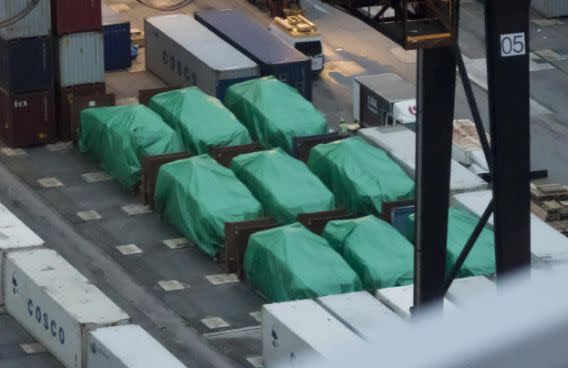PM Lee wrote to HK Chief Executive on Terrex issue: Ng Eng Hen

Prime Minister Lee Hsien Loong has written to Hong Kong Chief Executive Leung Chun-ying on the issue of Singapore’s seized military vehicles, said Defence Minister Ng Eng Hen.
Speaking in Parliament on Monday (9 January), Ng noted that Leung had responded by saying that the investigation into the matter is ongoing and will be handled in accordance with Hong Kong law.
“Singapore welcomes this response. Adherence to the rule of law has been the fundamental basis for peace and stability in the last half century in Asia,” said Ng.
The minister stressed that Singapore had asserted its position that the vehicles enjoy sovereign immunity as they are the property of the Republic and cannot legally be detained or confiscated by other countries.
Ng also revealed that the vehicles cost $30 million, as listed in the shipping manifest.
He was responding to questions from six Members of Parliament on the nine Terrex Infantry Carrier Vehicles (ICV) that were seized at the Kwai Chung Container Terminal in Hong Kong on 23 November.
According to the Ministry of Defence (Mindef), the vehicles were confiscated due to a request by Hong Kong authorities for routine inspections.
Despite multiple meetings between container shipping firm APL, which was shipping the vehicles from Taiwan to Singapore, and Hong Kong’s Customs and Excise Department, the issue has yet to be resolved.
In the wake of the Terrex incident, SAF has reviewed its shipping procedures comprehensively, to reduce the risk of SAF equipment from being “taken hostage” en route.
“If we think the risk of SAF assets (being seized) has gone up, whether in Asia or any other part of the world, we will impose extra precautions even if this means incurring higher freight charges.
“Alternatively, the SAF may consider housing that equipment at overseas training sites to avoid shipping them all together, and procure additional units to meet operational requirements where necessary.”
Ng noted the SAF has followed its procedures for shipping military equipment, including the use of commercial carriers, for over 30 years without any significant incidents.
“These commercial arrangements have enabled the SAF to ship military equipment safely and economically. It would cost three to four times more and add several hundred million dollars to Mindef’s annual budget to ship all military equipment directly from point to point.”
Queries in Parliament
In response to Sembawang GRC MP Vikram Nair’s query on whether the government was considering commercial claims against APL if the vehicles are not returned, Ng replied in the affirmative.
“We have been advised by our lawyers that there are legal avenues available to Mindef to claim for damages against the shipping carriers and contractors if they have not fulfilled their contractual obligations,” said the Minister, adding that the shipments of all SAF cargo are insured against losses, under some conditions.
Alluding to Ng’s comment that Singapore could not allow its property to be “taken hostage”, Aljunied GRC MP and Workers’ Party chief Low Thia Khiang asked if SAF had anticipated such a “hostage situation”.
Ng reiterated that while SAF occasionally makes special arrangements for the transport of equipment based on security risk assessments – chartering an entire ship, chartering whole ships, mandating direct shipments or deploying protection forces, for example – the Terrex vehicles did not fall into this category.
He stressed again that the vehicles were used for training and did not contain any classified information.
Last month, Ng said that while the incident was “a low point” for Singapore, the seized vehicles do not represent an “existential threat” for the Republic.


